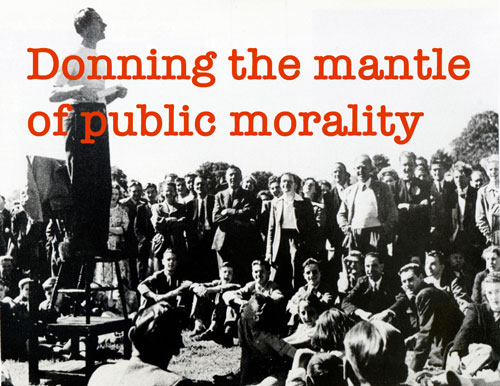I was at a condo's owners' meeting recently, whose sole purpose was to elect three directors to the board.
One of the previous directors had been removed from the board for
failing to pay his maintenance fees. When he was on the board, and not
paying his fees, he aggressively went after other owners who were in
arrears.
Prior to announcing his candidacy, he warned the other directors, that
his past failure to pay his unit's fees was confidential information,
that was protected by privacy laws, and that he would sue if that
information was divulged to the owners (voters).
Of course, the owners did find out and the ex-director lost the election.
The question is: Was the ex-director's failure to pay his common maintenance fees enjoy a right to privacy?
It could be argued that by running in an election to return to the
board, he was a partially public person. Not paying his condo fees may
not be of concern to the public at large but it certainly is to the
owners of a non-profit condominium corporation whose collective monthly
expenses are required to keep the condo running. If one unit is not
paying, and the lien process was not followed, it means that everyone
else will in one way or another pay more.
Also, a director has fiducial duties to the corporation. If a director
fails to uphold his responsibilities, is that not important information
to the other owners?
Finally we come to hypocrisy. When a director upbraids and humiliates
other ex-directors who he suspects of failing to pay their common
element fees, is he not unjustly placing his moral character above
theirs? Since he: “donned the mantle of public morality and mounted the
proverbial electronic or print soap box” has he not made himself a
public person?
Bill Crosby
Mr Cosby’s rank hypocrisy was the justification Judge Eduardo C.
Robreno gave in July 2015 for his decision to unseal documents to The
Associated Press (AP) from Ms. Constand’s 2005 civil suit against him.
Mr Cosby’s lawyers made the argument their client was not a public
person. Judge Robreno argued that he was—and not “by virtue of the
exercise of his trade as televised or comedic personality” but because
he had “donned the mantle of public morality and mounted the proverbial
electronic or print soap box.”
(See the Pound Cake speech also known as the the Ghettoesburg Address)
In doing so, wrote the judge, Mr Cosby has “voluntarily narrowed the
zone of privacy that he is entitled to claim.” Mr Robreno concluded
that “the stark contrast between Bill Cosby, the public moralist and
Bill Cosby, the subject of serious allegations concerning improper (and
perhaps criminal) conduct, is a matter as to which the AP—and by
extension the public—has a significant interest.”
Mr Cosby further hurt his case by publicly commenting on the matter.
Given the circumstances of this case, the Court concludes that the
Defendant has a diminished privacy interest and that this diminished
interest is outweighed by the AP’s and the public’s interest in gaining
access to his deposition testimony.
You can read the judgment here.
top contents
chapter previous next

